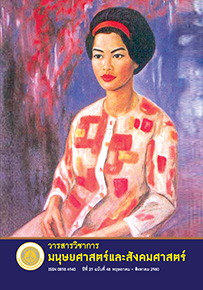“ความดี” “ความจริง” และ “ความยุติธรรม” ใน “คนนอก” ของอัลแบร์ การ์มูส์ The ‘Good’, the ‘Truth’ and ‘Justice’ in The Stranger by Albert Camus
Main Article Content
บทคัดย่อ
บทคัดย่อ
มโนทัศน์ “ความดี” และ “ความจริง” ได้มีข้อถกเถียงมากมายทั้งในแง่ของคำจำกัดความ และในแง่ของการนำไปใช้เพื่อหวังผลทางการเมือง และมโนทัศน์ทั้งสองนี้มักจะถูกทำให้เชื่อมโยงและวางคู่กันเสมอ แม้ในบางลักษณะแล้ว ความดีไม่จำเป็นต้องเป็นความจริงเสมอไป ในงานชิ้นนี้ได้พยายามอ่านวิเคราะห์นวนิยายเรื่อง “คนนอก (The Stranger)” ของอัลแบร์ การ์มูส์ เพื่อศึกษาความสัมพันธ์ระหว่างมโนทัศน์ “ความดี” และ “ความจริง” ที่ส่งผลต่อกระบวนการยุติธรรมในเนื้อเรื่องอย่างไรและสองมโนทัศน์นี้มีส่วนสำคัญในการพิจารณาตัดสินความผิดของเมอโซ (ตัวละครในเรื่อง) อย่างไร ผ่านการพิจารณาคำถาม 3 ข้อคือ 1) การเมืองว่าด้วยความจริงใน “คนนอก” เป็นอย่างไร 2) “คนนอก” พิจารณา “ความดี”อย่างไร 3) ความสัมพันธ์ระหว่างความจริงและความยุติธรรมใน “คนนอก” เป็นอย่างไร ทั้งนี้ผู้เขียนเสนอว่าสิ่งที่เรียนรู้จากนวนิยาย “คนนอก” คือ มโนทัศน์ “ความดี” นั้นไม่ได้มีสารัตถะความหมายในตัวเอง หากแต่เป็นความหมายที่แปรเปลี่ยนไปตามบริบทที่เฉพาะของสังคม และความหมายดังกล่าวนี้ได้กลายเป็นวิถีปฏิบัติที่คนในสังคมต่างยอมรับร่วมกัน นอกจากนี้ความหมายของ“ความดี” ที่ถูกกำหนดในแต่ละสังคมยังมีส่วนสำคัญในการพิจารณาว่าอะไรคือสิ่งที่ถือได้ว่าเป็น “ความจริง” และ “สิ่งนั้น” กลายมาเป็นตัวพิจารณาความหมาย “ความยุติธรรม” ให้กับสังคม
Abstract
The notions of ‘good’ and ‘truth’ have long been debated both in their definitions as well as their political applications.‘Good’ and ‘Truth’ seem to be often understood by many as if they were interchangeable although in fact the former is not necessarily the same as the latter. This article is an attempt to read Albert Camus’s novel The Stranger (L’Etranger) through examining how the notions of good and truth employing in the novel to determine the justice process in the story and how these two notions play crucial roles in determining the fate of Meursault, the protagonist of the novel. This article raises three main questions: 1) What is the politics of truth underlying the novel?; 2) How the novel address about the notion of good?; and 3) What is the relationships between truth, good, and justice implied in the novel? I argue that we could learn from The Stranger that the notion of good has no essential meaning of its own, but its definition varies according to each particular society’s context and its dominantly accepted ways of behaving. Moreover, each particular society’s definition of ‘good’ plays important role in determining what could be considered as truth and in turn determining the meaning of justice of its society.
Downloads
Article Details
บทความทุกบทความเป็นลิขสิทธิ์ของวารสารวิชาการมนุษยศาสตร์และสังคมศาสตร์ มหาวิทยาลัยบูรพาเท่านั้น


